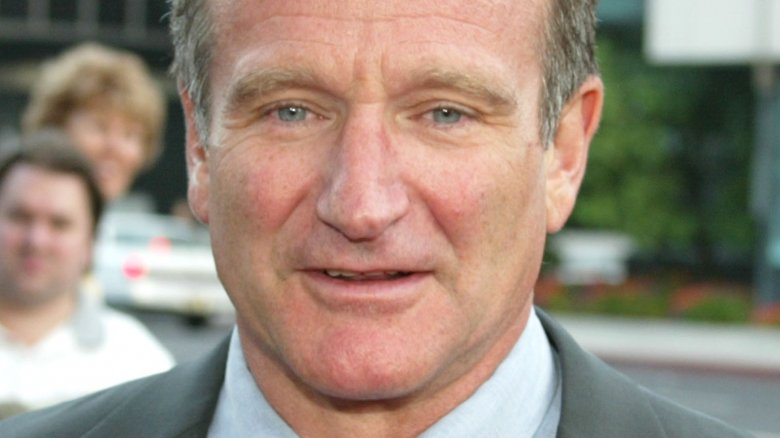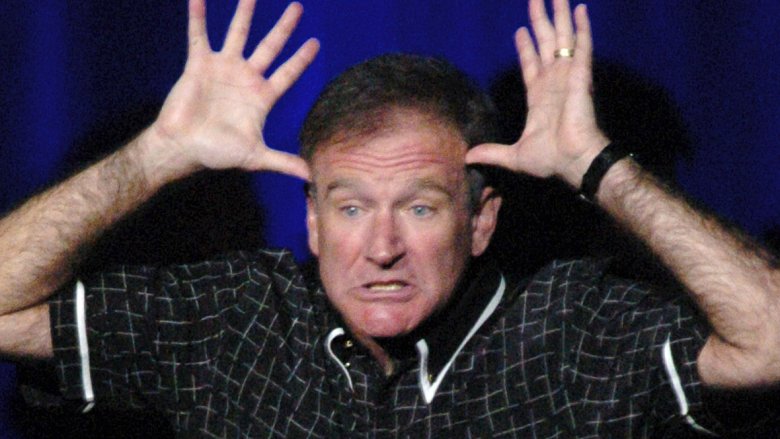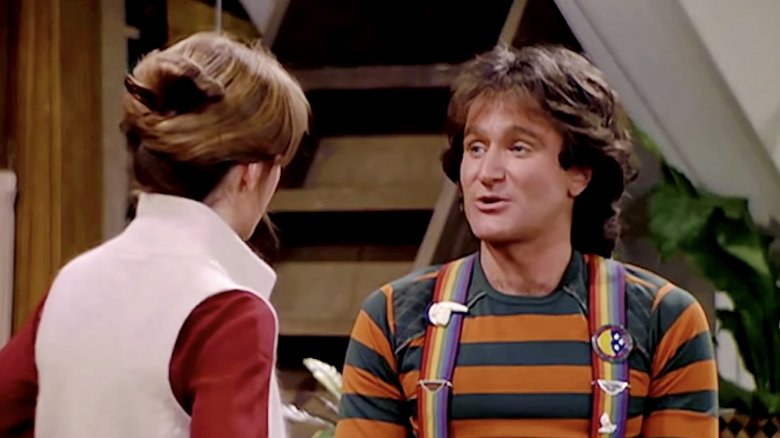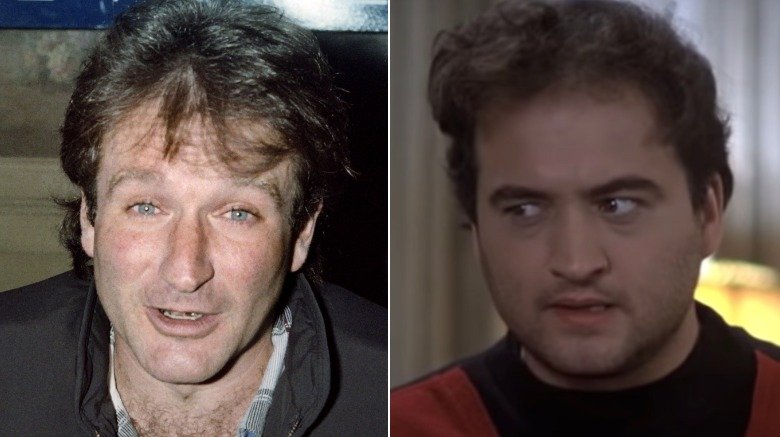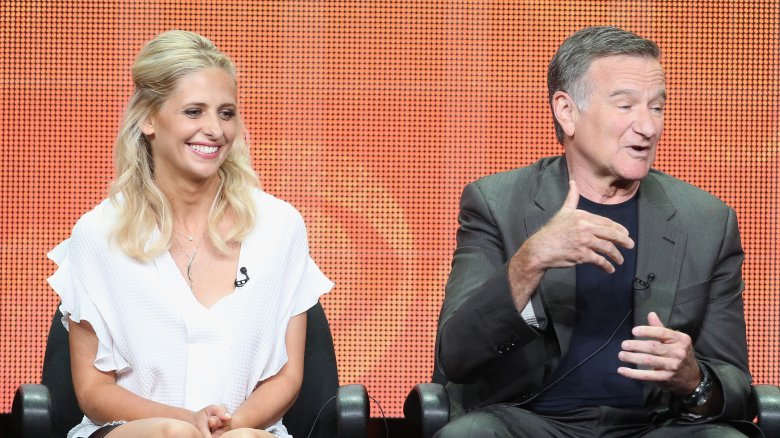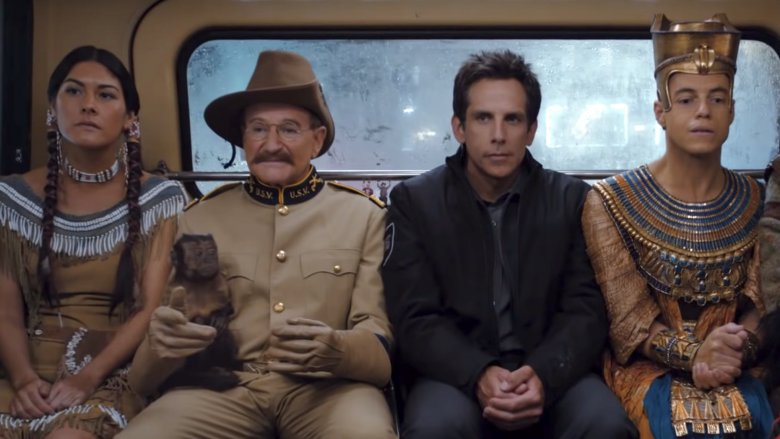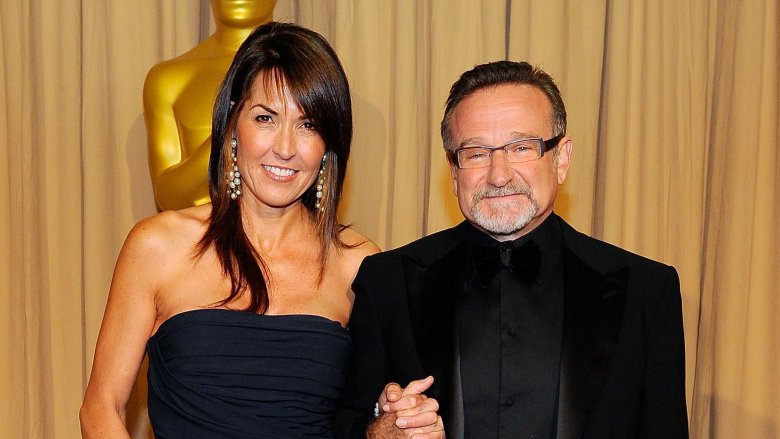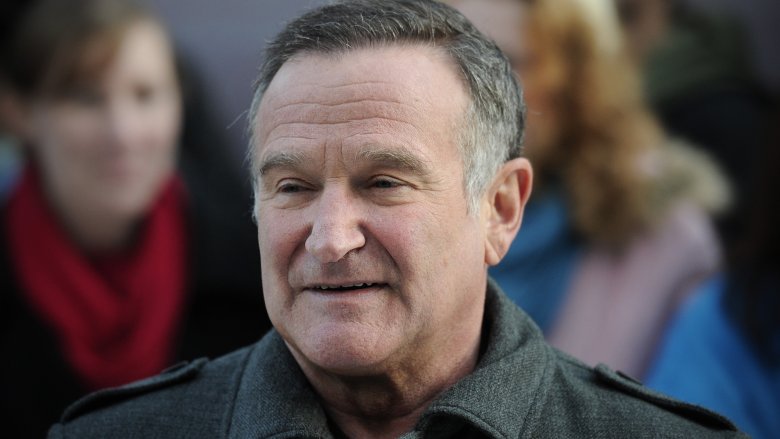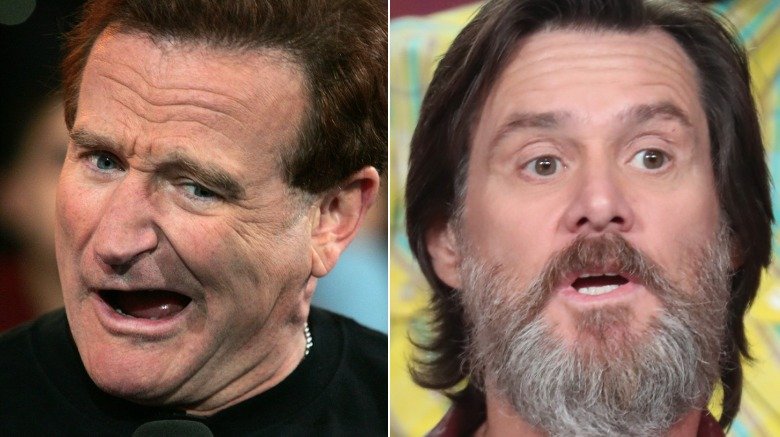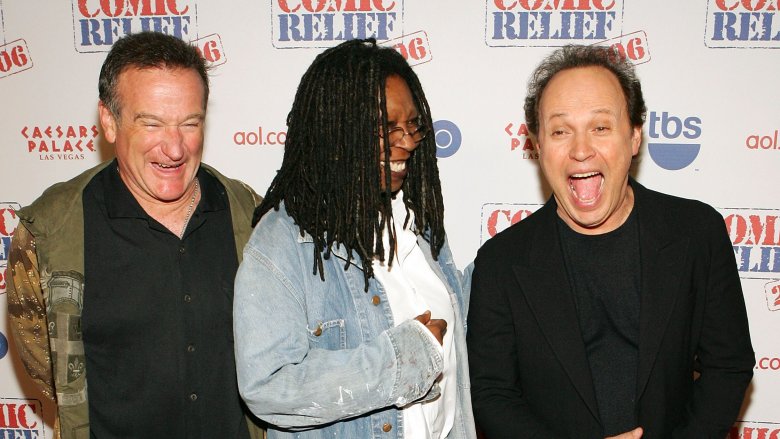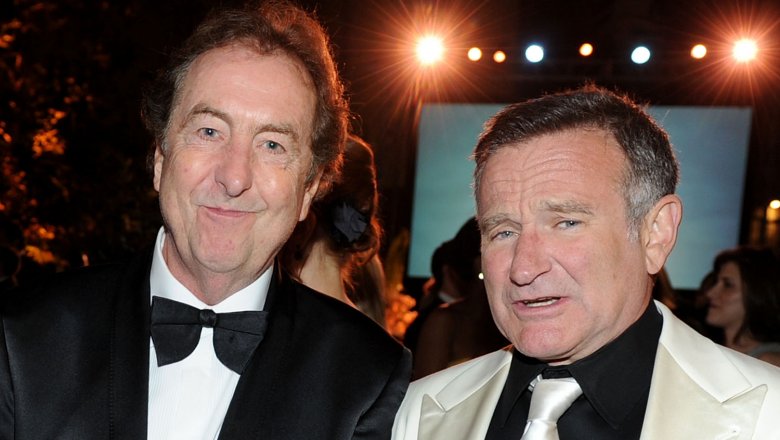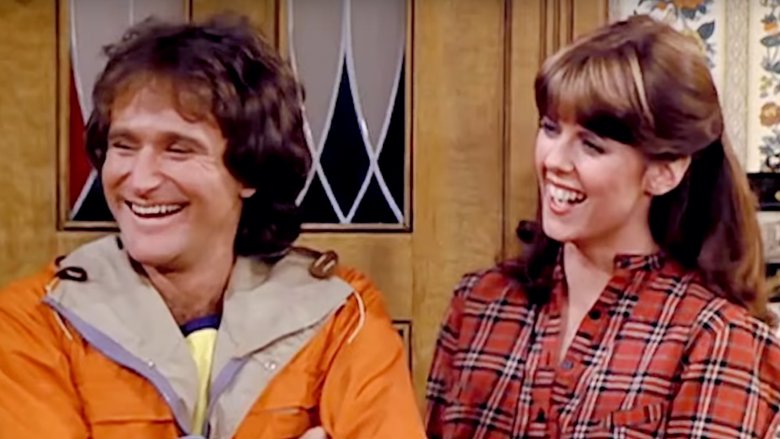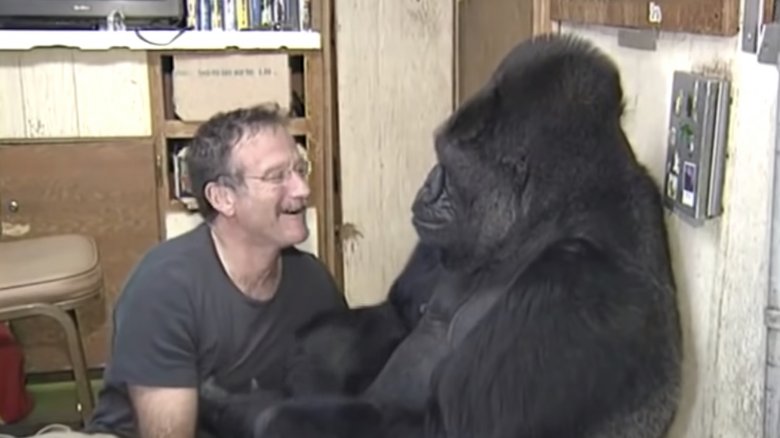Robin Williams: What's Come Out About Him Since He Died
Robin Williams was a force of nature. The Juilliard-educated actor became a superstar stand-up comedian in the '70s for his wild and crazy routines where he'd dart around the stage, rapidly cycling through various characters and voices. He was a perfect fit, then, for his 1978 breakout role in the sitcom Mork & Mindy, playing a kooky alien getting used to life on Earth. From there, he hit the movies, where he showed remarkable talent and range in everything from nutty comedies like The Birdcage and Mrs. Doubtfire to poignant dramas (he won an Oscar for 1997's Good Will Hunting). He also took voice-acting to new heights with his performance as Genie in Aladdin and even took the leading role in the psychological drama One Hour Photo.
We'll probably never again see another actor as beloved as Williams either. After his heartbreaking death at age 63 in 2014, numerous friends, Hollywood associates, and family members told the world about the Robin Williams they knew. Here are some things we didn't know about Williams until we lost him.
His improv wasn't always off the cuff
Williams' brain, body, and mouth moved so quickly that audiences could barely keep up as he bounced around a comedy club stage, Mork and Mindy's house, or a talk show set, riffing and ad-libbing in a hilarious, stream-of-consciousness style. He was a truly gifted improviser, but raw talent has to be massaged and sweetened. A lot of comedians hire writers, and Williams was no exception, as he was reportedly assisted for some time by a man named Bennett Tramer. "Being a writer for Robin's stand-up is like being a pinch hitter for Barry Bonds," Tramer said in the 2018 HBO documentary Robin Williams: Come Into My Mind (via Vulture). "You're not necessarily needed, except for special circumstances." Tramer helped Williams hone his ideas into his frenetic stage pieces. "He had a lightning-fast mind, but it wasn't like everything he did came from that night," Tramer explained. "There was real work and preparation."
Similarly, on Mork & Mindy, Williams' flights of comic anarchy were also the result of careful planning with outside input. According to Mork & Mindy writer David Misch (via i09), the staff stayed "up till four in the morning writing Robin's ad libs." He added that Williams did the script as written, but would add "a line here and there, a word here or there, a face, a voice."
Three cameras were not enough
Williams may have said his lines as typed out on his script pages, as Mork & Mindy writer David Misch said, but he'd veer into his own thing so suddenly, and so often, that it stymied the show's camera crew, as reported by The Washington Post. A studio sitcom episode is carefully mapped out by the director and camera operators, who plan out where they need to be for each line of dialogue, which they capture if actors are all in their assigned spots, or "marks" in industry terms. Well, Williams would often miss his mark. Because the operators had to do what they were told (to capture their footage and to follow union rules), they didn't get all of Williams' little ad-libs and sudden physical choices. So, creator and producer Garry Marshall came up with a solution: a fourth camera would be added to the traditional three-camera set-up with the new one trained solely on Williams. And now, having four cameras is the industry standard for studio-shot comedies.
He got sober when John Belushi died
Williams became a sensation in the '70s and '80s for his unhinged, comically explosive appearances. Offstage, he was also dancing as fast as he could — he reportedly hit the L.A. nightclub and party scene hard, and he wound up with a substance abuse problem.
One of his closest friends in show business was Animal House star John Belushi, who died of a drug overdose in March 1982. According to the documentary Robin Williams: Come Inside My Mind (via Vulture), Williams visited Belushi at the Chateau Marmont just hours before his death. The next day, the news of Belushi's passing hit the Mork & Mindy set, and producers thought it would be best for Williams to hear the news from his co-star and friend, Pam Dawber, who played Mindy. Given what had just happened with Belushi, Dawber was understandably worried about Williams' own problems with drugs. "We just walked together toward our trailers and, just before he went into his trailer, I said, 'If that ever happens to you, I will find you and kill you first,'" Dawber recalled telling her friend. "And he said, 'Dawbs, that's never gonna happen to me." And it didn't. He "backed off for a while, he cleaned up," said Mork & Mindy director Howard Storm (via Rolling Stone).
The not-so-crazy reason he did his final sitcom
For the first time since Mork & Mindy ended in 1982, Robin Williams returned to a regular network series with the 2013 CBS sitcom The Crazy Ones. Williams starred as Simon Roberts, a brilliant ad man who tries to reconnect with his estranged daughter, Sydney (played by Sarah Michelle Gellar), by making her a partner in his agency. As The Crazy Ones was free entertainment starring the great Robin Williams (and TV's Buffy, of course), more than 15 million people tuned in to watch the premiere episode. But many were decidedly underwhelmed; plenty of critics thought the show was only so-so and not befitting of Williams' talents, while the audience showed its opinion through the numbers — ratings continuously fell as the season progressed, with just over five million turning up for the season (and ultimately, series) finale.
So, why did Williams do the show? During a Reddit AMA, he said it was because of David E. Kelley, the creator of The Crazy Ones as well as quirky classics like Picket Fences and Ally McBeal. But Williams may have also had more practical interests at heart. His per-episode salary was a robust $165,000, which, as pointed out in Dave Itzkoff's biography Robin (via Vanity Fair), was more than he'd get in a month acting in an independent movie.
He had a hard time on the set of one of his final movies
Williams didn't end his career with an Oscar-winning masterpiece like Good Will Hunting, or a blockbuster comedy like Mrs. Doubtfire. One of the last pieces of work Williams finished finished was a supporting role in the trilogy-completing family film Night at the Museum: Secret of the Tomb, in which he played Teddy Roosevelt.
According to a Neurology article written by the comedian's wife, Williams suffered a panic attack on the set of that movie, and his doctor prescribed an antipsychotic medication. "It seemed to make things better in some ways, but far worse in others," she said. One of the medication's consequences was that Williams forgot some of his lines while filming the movie, which was reportedly shocking given that Williams seemed to be a man who was never at a loss for words. He reportedly confided all this in makeup artist Cheri Minns, which she related in the biography Robin (via the New York Post). "He was sobbing in my arms at the end of every day. It was horrible," Minns said.
She also claimed she told Williams that doing a stand-up set might get him back into the right frame of mind. "He just cried and said, 'I can't, Cheri. I don't know how anymore. I don't know how to be funny,'" she recalled.
He had a devastating condition
In late 2013, as Williams' wife, Susan Schneider Williams, shared in Neurology, the actor and comedian began to suffer from "paranoia, delusions and looping, [and] insomnia," as well as the panic and memory loss he experienced on the set of the third Night at the Museum movie. In late May 2014, doctors diagnosed the actor with Parkinson's disease, a horrible condition that slowly robs the body of all of its physical capabilities. As the year wore on, Williams suffered from a hand tremor and a "slow, shuffling gait," and, at times, he felt he could not properly express himself or was unable to move.
Driven to a deep depression, Williams took his own life via hanging in August 2014 (via SF Gate). Three months later, an autopsy revealed the extent of Williams' harrowing medical problems: He had diffuse Lewy body dementia, otherwise known as Lewy body disease. The Lewy Body Dementia Association calls the condition a "biological disease process in the brain," which can cause severe depression, anxiety, paranoia, and memory loss. In her Neurology piece, Schneider Williams said her husband had endured "an intense, confusing, and relatively swift persecution at the hand" of LBD.
He returned to rehab, but it wasn't for substance abuse
When Williams died in August 2014, it wasn't the first time that summer he'd been in the news. In early July, People reported that the actor had checked into a drug rehab facility. He hadn't suffered a relapse in his recovery — he'd entered an alcohol rehab program in 2006 — but rather he reportedly wanted to make sure he didn't go down that road. "Robin is simply taking the opportunity to fine-tune and focus on his continued commitment" to sobriety, his representative said.
In the 2018 biography Robin, author Dave Itzkoff revealed (via Vanity Fair) the real reason why Williams walked into the Dan Anderson Renewal Center in Minnesota shortly before his death. The actor and his wife, Susan, thought that some time off would be helpful to him, as Williams would be "cloistered on a campus where he could receive close supervision, and where he could meditate, do yoga, and focus on further 12-step work." They hoped it would equip him with some mental and emotional tools to help him cope with his encroaching illness.
Billy the Kid vs. Maestro
Robin Williams was a one-of-a-kind actor, but his closest comedic equal would probably have to be Jim Carrey. As Williams gained fame as the silly alien Mork on Mork & Mindy before moving on to enjoy a varied film career, Carrey went over-the-top goofy on In Living Color before segueing into movies, some silly, some serious. According to makeup artist Cheri Minns, who recalled moments with Williams for Dave Itzkoff's Robin, Williams noticed similarities between himself and Carrey, and that caused him to become "completely freaked out," allegedly thinking that Carrey "was going to take over." According to the book (via Cinema Blend), it got especially bad when Carrey won the role of The Riddler in 1995's Batman Forever, which Williams had reportedly passed on.
When Radar Online published a piece about those alleged trivia nuggets from Robin with a headline claiming that Williams and Carrey had a "bitter feud," Carrey issued a statement calling out the site for exaggerating the facts. "RadarOnline is completely off base and creating a feud that didn't exist," he wrote (via Cinema Blend). "Robin may have expressed insecurity about me and my rise to success but I have never had anything but the greatest respect for him and his genius." Furthermore, Carrey said that the two had met in person and even had nicknames for each other: Carrey called Williams "Billy the Kid" and William called Carrey "Maestro."
He gave a lot (and nobody knew)
Robin Williams was famously linked to a number of charities and causes during his time in the spotlight. Not only did he host HBO Comic Relief specials with Billy Crystal and Whoopi Goldberg for years (via Variety), but he also publicly advocated for St. Jude Children's Research Hospital and served on the board of the spinal cord injury research charity Christopher & Dana Reeve Foundation, as noted by CNN. According to celebrity charity tracker Look to the Stars (via CNN), Williams gave his money and time to more than 50 organizations. After his death, some of these charities shared details about Williams' involvement, which was both low-key and very generous. According to CNN, Williams never charged St. Jude an appearance fee for his time filming a commercial or meeting with sick children and their parents. Peter Wilderotter, CEO of the Reeve Foundation, said that Williams paid his own way to "two or three" fundraising events each year and "talked to everyone," as well as made financial contributions that "weren't token gifts." (In other words, they were huge.)
And then there were his gifts to Seattle. In 2004, 2007, and 2008, Williams performed stand-up at a local venue called the Showbox (via the Mirror). He earned a total of $50,000 for those gigs, all of which he donated to the West Seattle Food Bank.
He almost joined Monty Python
The surviving members of Monty Python reunited in 2013 for a series of live shows at the O2 Arena in London. The performances were also something of a victory lap and a self-tribute, in that each night featured a special celebrity guest star, as reported by Entertainment Weekly. Michael Palin performed a sketch with a different Python-influenced performer each night, including actor Simon Pegg and, on the final night, funnyman Mike Myers. Appearing on stage with the Pythons on what was probably their final group performance was likely a huge honor, and it was actually offered to and planned for a comedian even more famous than Myers: Robin Williams.
"Robin was supposed to come and do the last night," Monty Python member Eric Idle told EW. The two were friends, and they had appeared in the 1988 film The Adventures of Baron Munchausen together. "And all the time I was getting emails from him, and he was going downhill. Then he said he could come, but he didn't want to be onstage." Williams ultimately didn't hit London at all. "In the end he said, 'I can't come, I'm sorry, but I love you very much,'" Idle shared. "We realized afterwards he was saying goodbye."
Mork, you can't do that to Mindy
The #MeToo and Time's Up movements have prompted numerous brave women (and men) to speak out about the sexually inappropriate behavior they've endured on the sets of movies and TV shows. The shocking and gross revelations about the appalling behavior of powerful actors and Hollywood industry types go back decades, and, in 2018, actress Pam Dawber publicly shared what she went through while making Mork & Mindy in the late '70s and early '80s. Robin Williams, it would seem, would do anything for a laugh. "I had the grossest things done to me by him," Dawber shared in Robin (via The Guardian). "I mean I was flashed, humped, bumped, grabbed." Additionally, Dawber claimed that Williams wrestled her, farted on her, would appear on set in the nude, and once poked elderly co-star Elizabeth Kerr in the rear end with a cane.
However, Dawber said, she "never took offense" because Williams would "look at you, really playful, like a puppy, all of a sudden. And then he'd grab your t**s and then run away. And somehow he could get away with it. It was the 70s, after all."
Even animals were sad when he died
Robin Williams had a lot of pals, but they weren't all human. Back in the early 2000s, he struck up a friendship with Koko, the super-intelligent, sign language-fluent gorilla. (You might remember her from Koko's Kitten, the classic children's book that told the true story of the sweet gorilla coming to be the guardian of an adorable little feline.) Williams visited Koko at her home, the Gorilla Foundation, as part of a charitable effort to raise awareness of the struggle between wild gorillas and poachers. "Meeting Koko was unforgettable," Williams said (via Business Wire). "Koko used sign language to ask me to play with her. We shared interspecies laughter."
It was a profound experience for Koko, too. When Williams died, Koko's handlers, Drs. Penny Patterson and Ron Cohn, let Koko know. Patterson told Koko, "We have lost a dear friend, Robin Williams." The gorilla reportedly then spent much of the day "very somber, with her head bowed and her lip quivering." Like the rest of the world, Koko was devastated.

